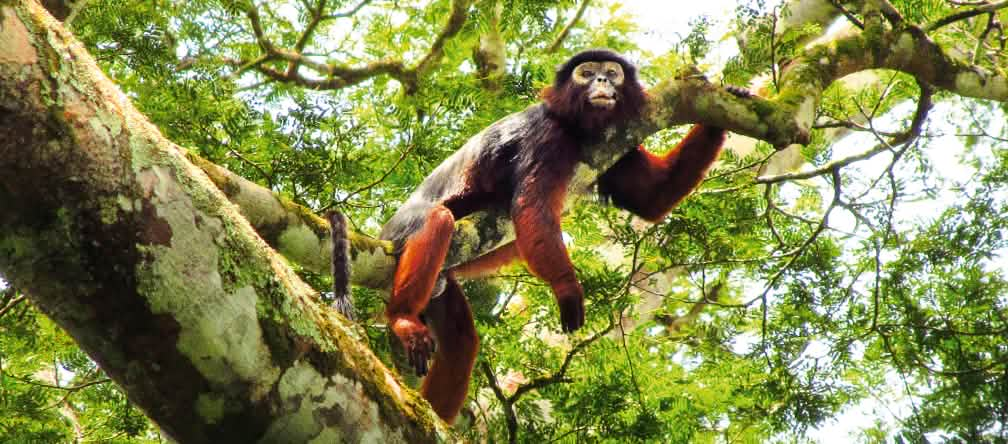
Completed campaign
Uganda: stop the destruction of Buvuma Island
10,000 hectares of forest near Lake Victoria are about to be destroyed for oil palm plantations: the Ugandan government is awarding land on Buvuma Island to international investors. The island’s inhabitants, however, want to protect their nature, homes and livelihoods. Please support their struggle with your signature.
To: the Right Honorable Speaker of Parliament of the Republic of Uganda, Rebecca Alitwala Kadaga
“10,000 hectares of forest near Lake Victoria are about to be destroyed for palm oil. Put forest conservation before investment in industrial agriculture.”Investors want to establish 10,000 hectares of oil palm plantations on Buvuma Island in Lake Victoria. Ugandan environmentalists are alarmed by the prospect and are warning of the loss of biodiversity and possible extinction of species. “Animals such as the colobus monkey could be wiped out if their forest habitat is destroyed,” says environmentalist Joan Akiiza of the National Association of Professional Environmentalists (NAPE). Many bird species have already disappeared.
Palm oil companies discovered the region around 15 years ago. On the island of Bugala, they have already destroyed 8,500 hectares of forest – and with it the livelihoods of numerous families. “People were robbed of their land and forests were felled to plant oil palms, which massively degraded the island's ecosystem,” Akiiza notes.
Villagers on Buvuma fear that they are next in line to have their land stolen and human rights trampled. “Land grabbing and monocultures are detrimental to our agriculture and are putting our food security at risk,” they wrote to the Speaker of Parliament, Rebecca Kadaga Alitwala.
The people on the islands in Lake Victoria need our support. Please call on Uganda’s government to protect the threatened forests on Buvuma and prevent further deforestation on Bugala.
Bidco, a multinational company that produces edible oils, detergents, soaps and margarine, is active in the Lake Victoria region. The company has close ties to Wilmar International, a Singaporean palm oil giant that has been implicated in environmental destruction and human rights violations in numerous countries.
Foreign companies need the approval of the Ugandan government to access land. Since they are not allowed to own land by law, the government has been buying land from unsuspecting locals and leasing it to companies.
To: the Right Honorable Speaker of Parliament of the Republic of Uganda, Rebecca Alitwala Kadaga
Madam Speaker,
In Kalangala district on Lake Victoria, 8,500 hectares of oil palm plantations have already been established. Overall, 10,000 hectares have been awarded to investors. The beneficiaries include Bidco and palm oil giant Wilmar International. The forest and other sensitive ecosystems on Bugala Island have been largely destroyed. Many residents complain that they were robbed of their land and plunged into poverty.
The Ugandan government now wants to allocate a further 10,000 hectares of land to investors in the palm oil industry. At the same time, it is apparently seeking to amend a law to make it easier to provide land to foreign companies.
Ugandan environmentalists are alarmed by the expansion and are warning of consequences such as loss of biodiversity and the possible extinction of species.
Villagers on Buvuma fear that they will be the next to have their land grabbed and human rights trampled.
Please take steps to prevent land at Lake Victoria from being given to investors in industrial agriculture and protect the forest on Buvuma from impending destruction.
Sincerely,
The issue – rainforest on our dinner tables and in our fuel tanks
At 66 million tons annually, palm oil is the most commonly produced vegetable oil. Its low world market price and properties that lend themselves to processed foods have led the food industry to use it in half of all supermarket products. Palm oil can be found in frozen pizzas, biscuits and margarine, as well as body creams, soaps, makeup, candles and detergents.
Few people realize that almost half of the palm oil imported into the EU is used as biofuel. Since 2009, the mandatory blending of biofuels into motor vehicle fuels has been a major cause of deforestation.
Oil palm plantations currently cover more than 27 million hectares of the Earth’s surface. Forests and human settlements have been destroyed and replaced by “green deserts” containing virtually no biodiversity on an area the size of New Zealand.
The impact – suffering and death in producer countries, climate havoc
The warm, humid climate of the tropics offers perfect growth conditions for oil palms. Day after day, huge tracts of rainforest in Southeast Asia, Latin America and Africa are being bulldozed or torched to make room for more plantations, releasing vast amounts of carbon into the atmosphere. As a consequence, Indonesia – the world’s largest producer of palm oil – temporarily surpassed the United States in terms of greenhouse gas emissions in 2015. With their CO2 and methane emissions, palm oil-based biofuels actually have three times the climate impact of traditional fossil fuels.
Palm oil is not only bad for the climate: As their forest habitat is cleared, endangered species such as the orangutan, Borneo elephant and Sumatran tiger are being pushed closer to extinction. Smallholders and indigenous people who have inhabited and protected the forest for generations are often brutally driven from their land. In Indonesia, more than 700 land conflicts are related to the palm oil industry. Human rights violations are everyday occurrences, even on supposedly “sustainable” and “organic” plantations.
As consumers, we are largely unaware of these broader issues, yet our daily palm oil consumption also impacts our health: refined palm oil contains large amounts of harmful fatty acid esters that are known to damage DNA and cause cancer.
The solution – a revolution on our dinner tables and in our fuel tanks
Only 70,000 orangutans still roam the forests of Southeast Asia, yet the EU’s biofuels policy is pushing them to the brink of extinction. Every new plantation on Borneo is destroying a further piece of their habitat. Stepping up the pressure on policymakers is a must if we want to save our tree-dwelling kin. Apart from that, however, there is still a lot we can do in day-to-day life.
Follow these simple tips to recognize, avoid and combat palm oil:
- Enjoy a home-cooked meal: Use your imagination: why not try almond-coconut-pear biscuits? Or pizza with potato and rosemary? A meal cooked from fresh ingredients beats processed foods containing palm oil every time. Oils such as sunflower, olive, rapeseed or flaxseed are ideal for cooking and baking.
- Read labels: As of December 2014, labeling regulations in the EU require food products to clearly indicate that they contain palm oil. However, in the case of non-food items such as cosmetics and cleaning products, a wide range of chemical names may still be used to hide the use of palm oil. A quick check of your favorite search engine will turn up palm oil-free alternatives, however.
- Remember that the customer is king: Ask your retailers for palm oil-free products. Write product manufacturers and ask them why they aren’t using domestic oils. Companies can be quite sensitive to issues that give their products a bad name, so inquiring with sales staff and contacting manufacturers can make a real difference. Public pressure and increased awareness of the problem have already prompted some producers to stop using palm oil.
- Sign petitions and write your elected representatives: Online campaigns put pressure on policymakers responsible for biofuels and palm oil imports. Have you already signed all of Rainforest Rescue’s petitions?
- Speak out: Protest marches and creative action on the street raise public and media awareness of the issue, which in turn steps up the pressure on policymakers.
- Leave your car at home: Whenever you can, walk, ride a bicycle or use public transport.
- Be informed and inform others: Big Business and governments would like us to believe that biofuels are good for the climate and that oil palm plantations are sustainable. Spread the word – share this information with your family and friends and encourage them to rethink their consumption habits. It’s in our hands!

